I always like knowing what car designers were initially thinking when they started the design process. I think the beginning is important because sometimes the eventual final product gets so diluted and altered by the cruel realities of economics and physics and market demands, perceived or otherwise, that the original motives and goals can get lost. But once you have some idea of what they were going for, at least at first, it often lets you see the final product in a new, perhaps more understanding light.
I’m not saying this makes a lousy design any better, but at least it helps you understand it more, and get a glimpse of the thought processes and influences that were intended, at least in the beginning. Sometimes this knowledge lets you appreciate the car more, too.
It’s kind of like how once you really look at Syd Mead’s paintings of futuristic, massive cars, you may start to understand a little more about what so many huge American land yachts of the 1970s wanted to be, and for me at least, that knowledge makes me see the cars in a more understanding and appreciative light.

Volkswagen’s Head Designer, Andy Mindt, recently took to Instagram to show the thinking behind VW’s new design language, which we’ve seen most recently in the VW ID.Cross concept:
It’s not all that often that an automaker’s Head Designer shows so explicitly what they’re design motivations are in a social media post, but I suppose it happens, sometimes. It’s worth digging into it a bit, because I think it’s interesting, mostly because of the somewhat unique circumstances of VW design.
The unique circumstance I think is that if a designer wants to incorporate some kind of heritage DNA (designers love to use the term DNA to refer to an amorphous set of design cues and styles that have stayed with a brand a while) then they have two very distinct eras and types of design to pick from: the air-cooled and liquid-cooled eras.
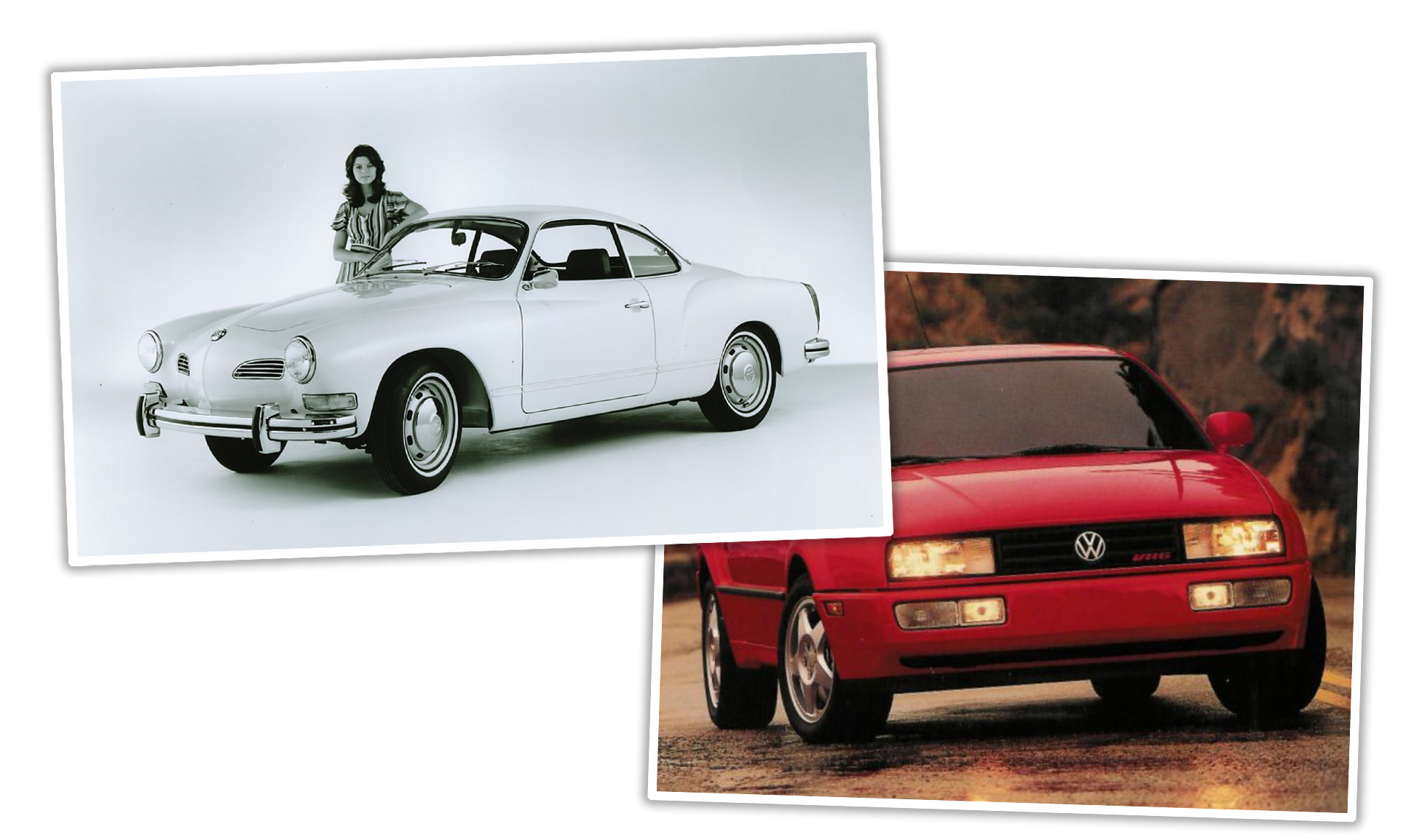
VW started, of course, as a company that made exclusively rear-engined, air-cooled cars. The early designs are rooted in the 1930s, but developed over time, though generally still maintained a highly curvilinear, flowing sort of design concept. There’s exceptions, sure, but if you had to pick one word to very generally describe old air-cooled VWs, round wouldn’t be a bad choice.
Then, around the late 1960s for complex reasons I’ve gone over before, Volkswagen began to transition to front-engined, liquid-cooled cars, using mostly technology derived from NSU and Auto-Union, culminating in the first-generation Golf/Rabbit in 1974, with its Giugiaro folded-paper rectilinear design. That design language grew and developed over time, of course, and now when one talks about a VW design heritage, you really have to think of that as two very distinct things.
It looks like Mindt’s goal is to – sort of – combine both.

In the sketches he posted, he seems to explain current VW Design DNA as a sort of arithmetic between two eras of design: mid-period liquid-cooled VW, as embodied by the Mark IV Golf there, and the original air-cooled VW design, represented by the ID.Buzz there.
Now, I bet you see the tricky part here: the ID.Buzz is not an original air-cooled VW design; it’s a modern interpretation of such a design, the original air-cooled Type 2 buses. So he’s sort of combining a classic VW design with a re-interpretation of a classic VW design. I’m not saying that’s bad, necessarily, but just clarifying what it is.
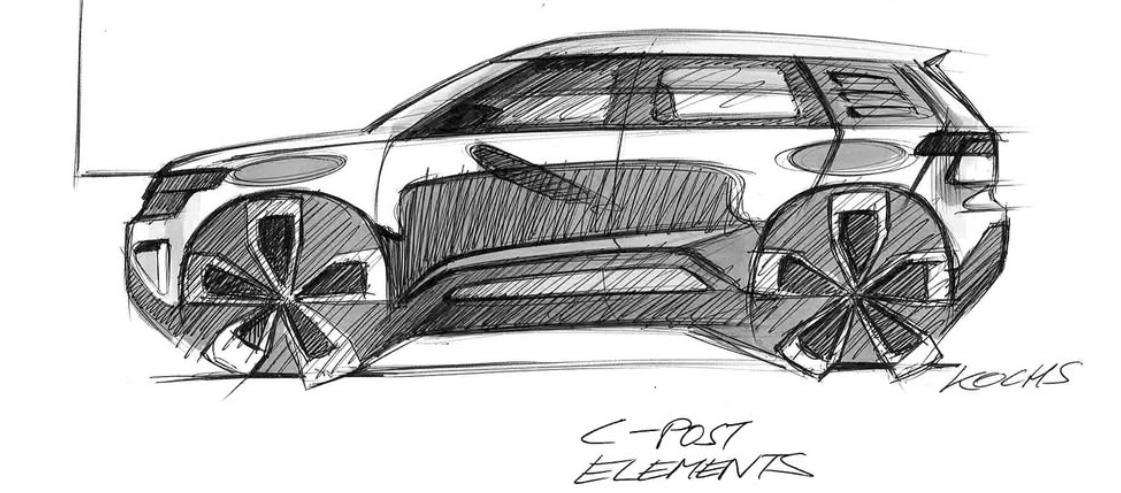
In the ID.Cross concept, those two elements seem to show up in I think at least three distinct ways: the emphasized wheelarches of the Mk.4 Golf – though, to be fair, they are exaggerated in these sketches and pretty much every designer’s sketches and concepts emphasize the wheelarches – and then the C-pillar elements, which actually do seem to combine both the re-imagined air-cooled elements and the Mk.4 Golf elements.
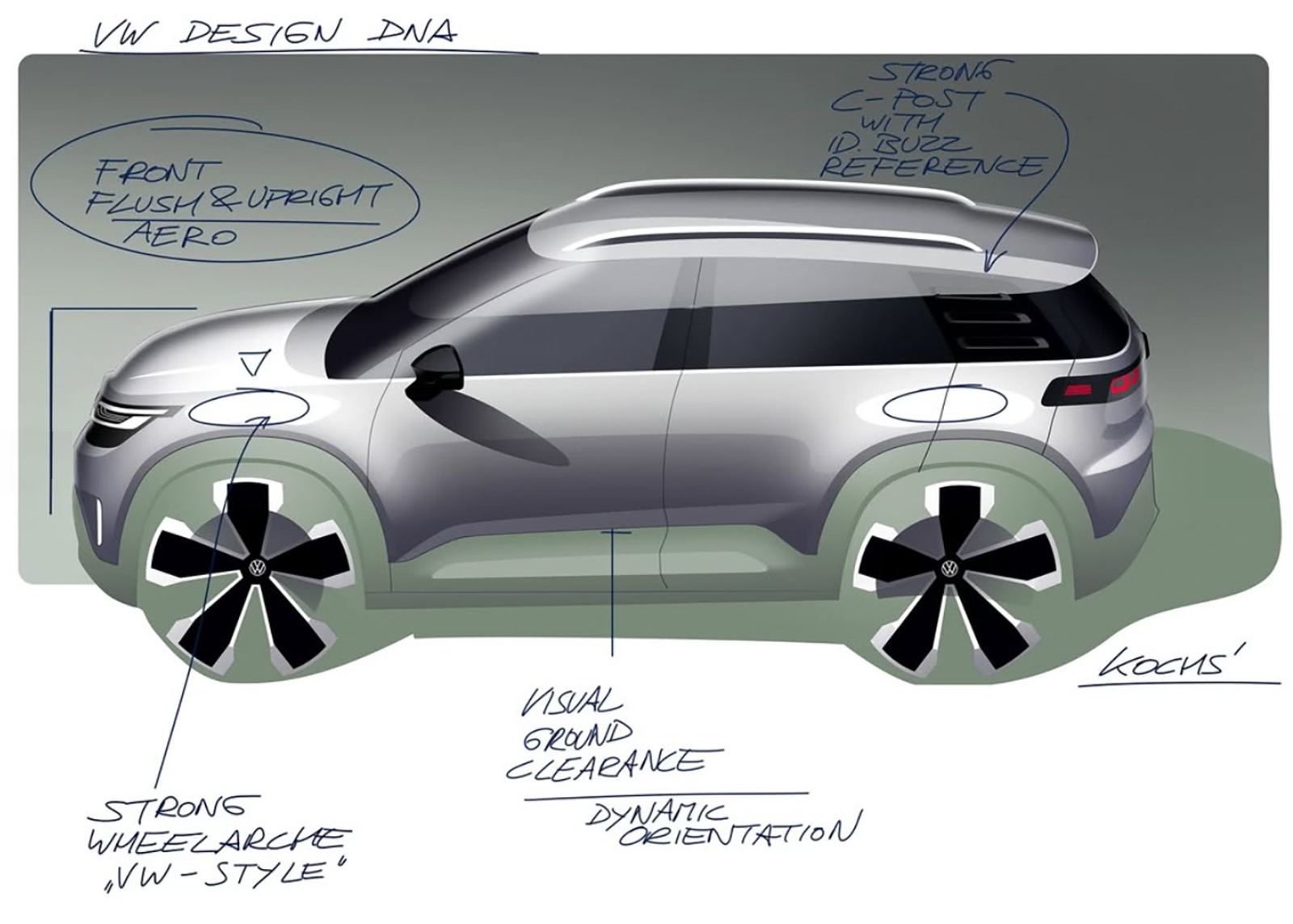
Most obvious is the upper C-pillar with the groove detailing from the ID.Buzz, as you can see up top, and you can see in the D (maybe E?) pillar of the van, those three pill-shaped horizontal things at the rear:

Those pill-shaped-details are meant to evoke the air intakes for the rear engine of the original Type 2s:
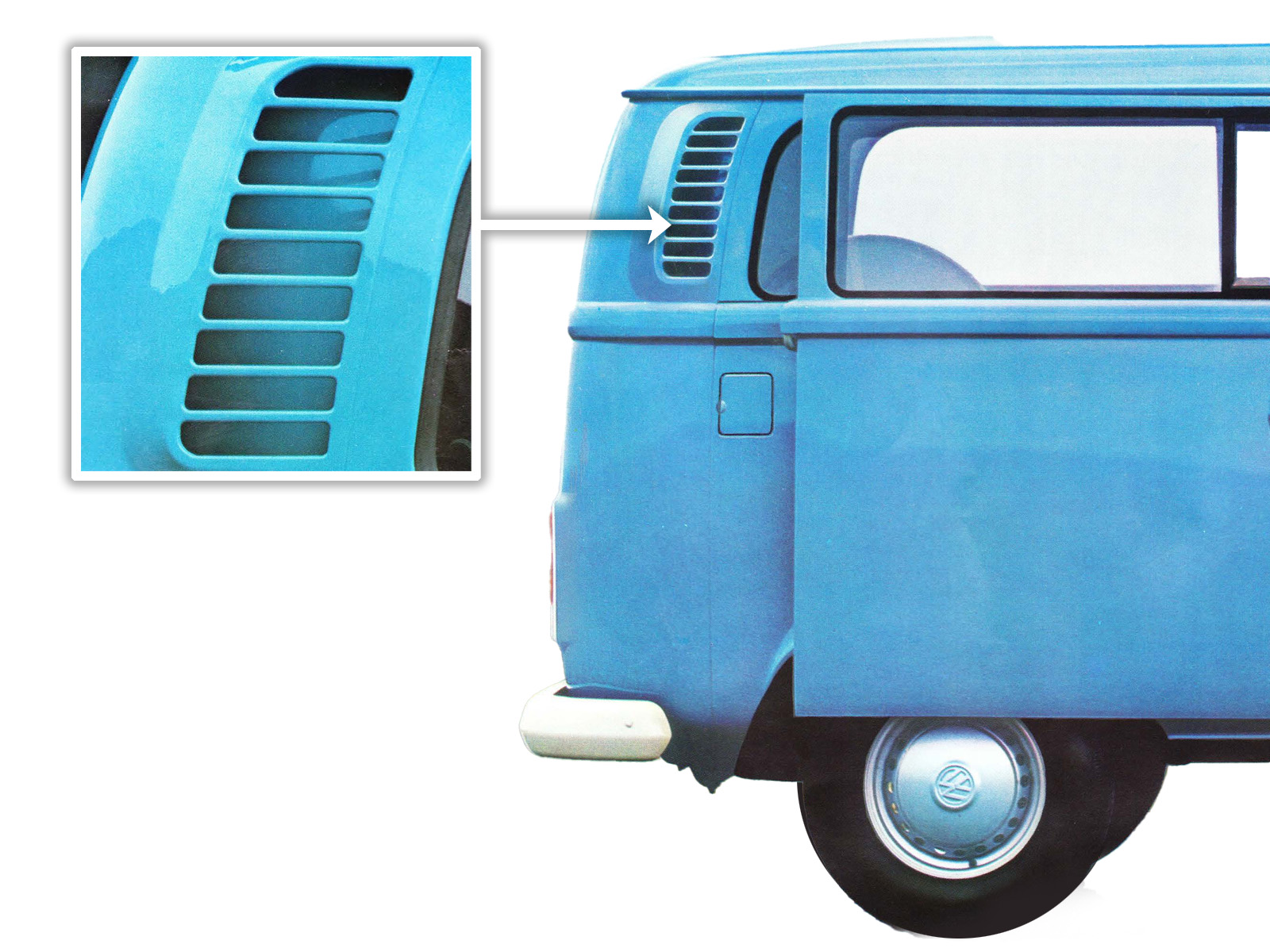
And, sure, they sort of do, and I like that they exist there. It’s a reference that’s a little bit of a Xerox of a Xerox, though, and I can’t help but wonder why the designer didn’t just use the actual original source as the inspiration and reconsider new ways to modernize it? Or maybe that work was already considered done when the vents were translated into the Buzz’ modern design language?
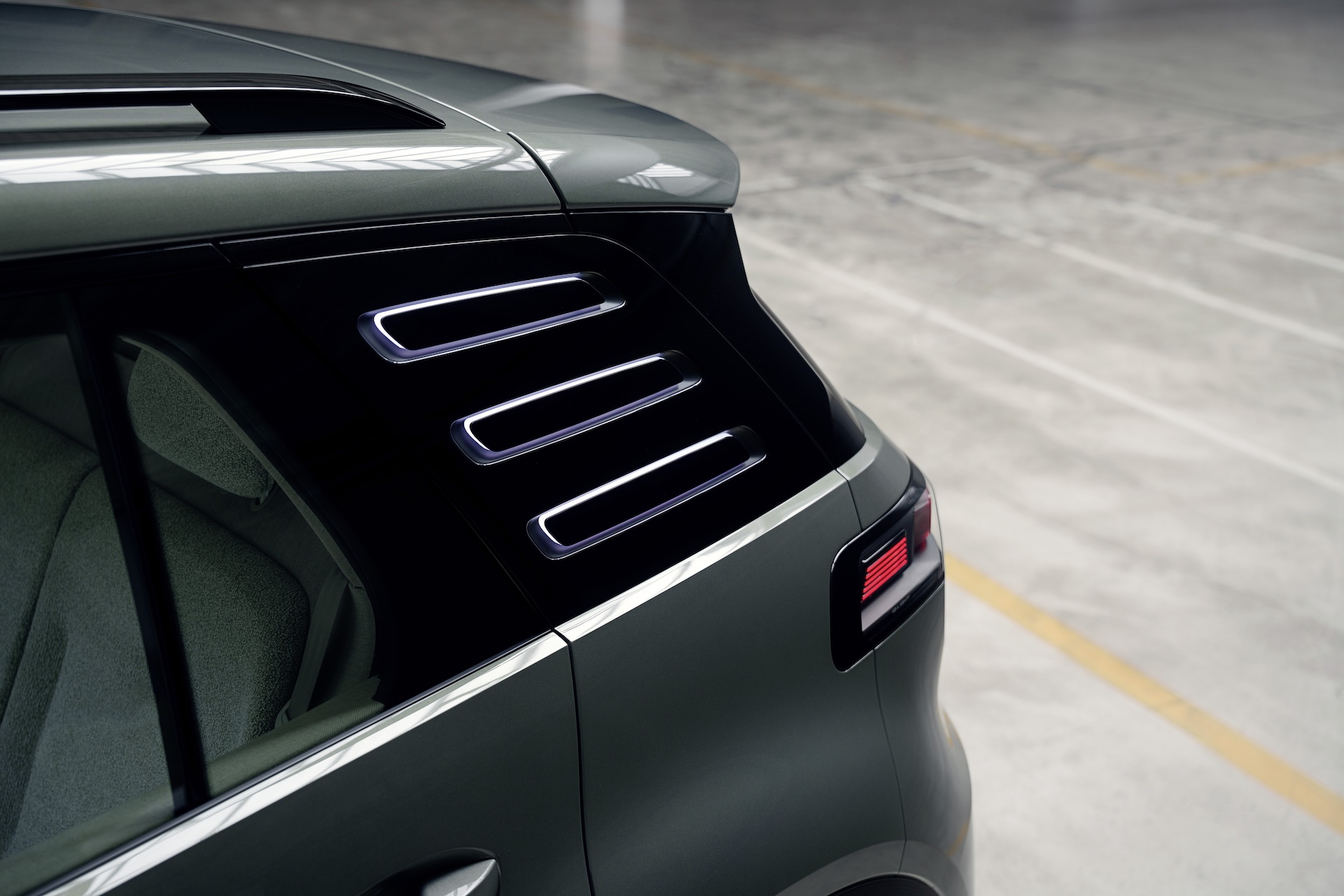
There seems to be another element of the C-pillar that is taken from the Mk.4 Golf, and it’s one of my favorite design details of that generation of Golf. It’s this bit:

The two-door Golf didn’t have this part, because it relies on the cutline of the rear doors. This whole era of Golf was very good about respecting cutlines and making them deliberate-seeming parts of the design. Not byproducts of production to try and ignore, but actual details to celebrate. This C-pillar is a great example of this, forming a strong S-shaped element in the rear of the car, turning what could have been awkward bulk into something interesting. Look how the taillight conforms to the same panel line, too!
I think something similar seems to be being attempted on the ID.Cross concept:
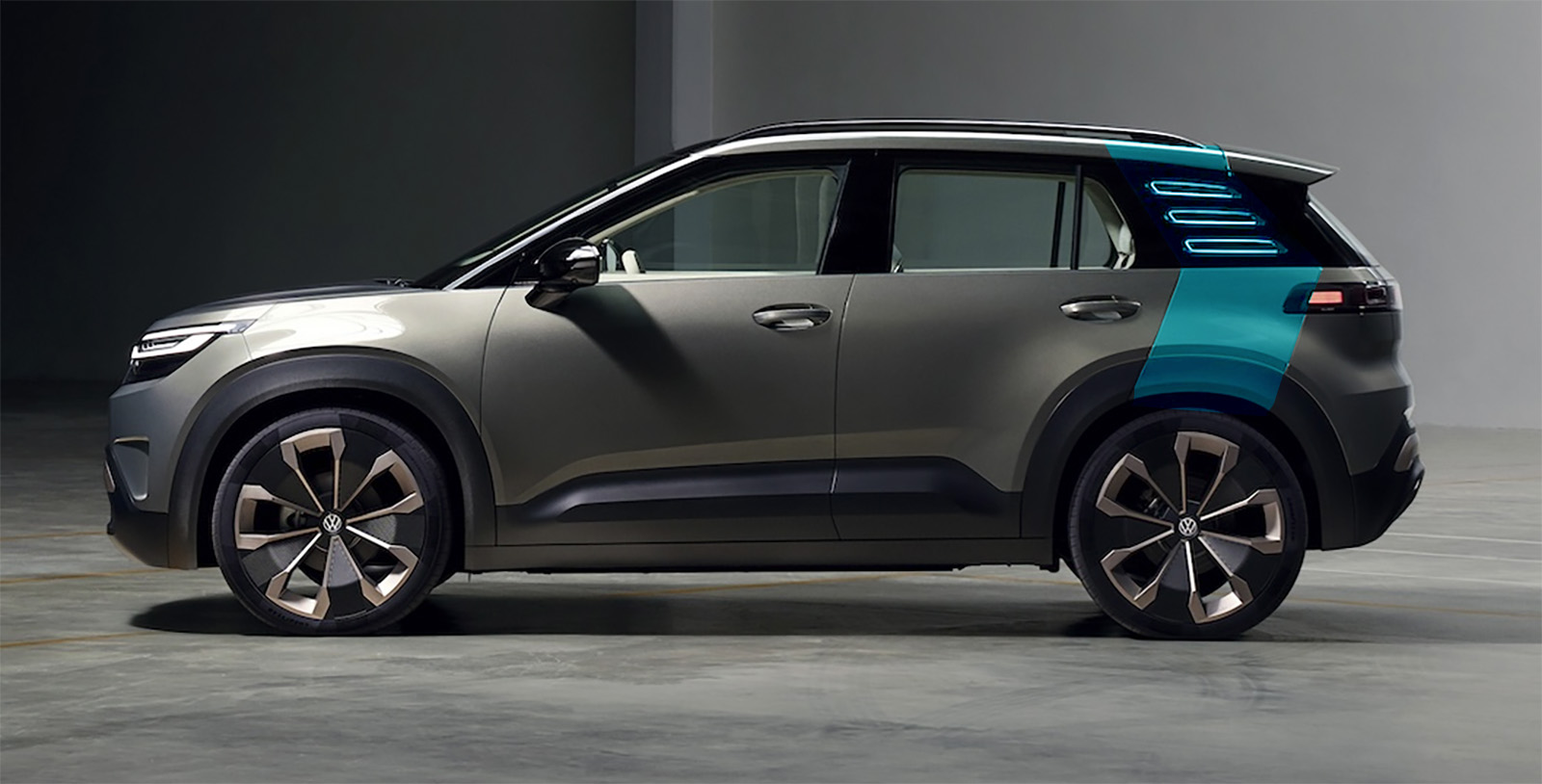
I mean, I think that’s what’s going on here. Does the attempt to work the Type 2-style not-vents in there and the S-shaped pillar at once work? Maybe?
I’m not really sure what I make of all of this, at least not yet. The ID.Cross is attractive enough, and I do think it’s the sort of thing that could sell well in America right now. Are the references to the Mk.4 Golf and ID.Buzz noticable? Kind of? Would I like to see more risks taken, and more obvious nods to VW’s rich and varied design heritage? Absolutely.
No matter what, I appreciate seeing the thought process behind these designs, and I hope to see even more. I’m greedy that way.
Top Photo: Volkswagen

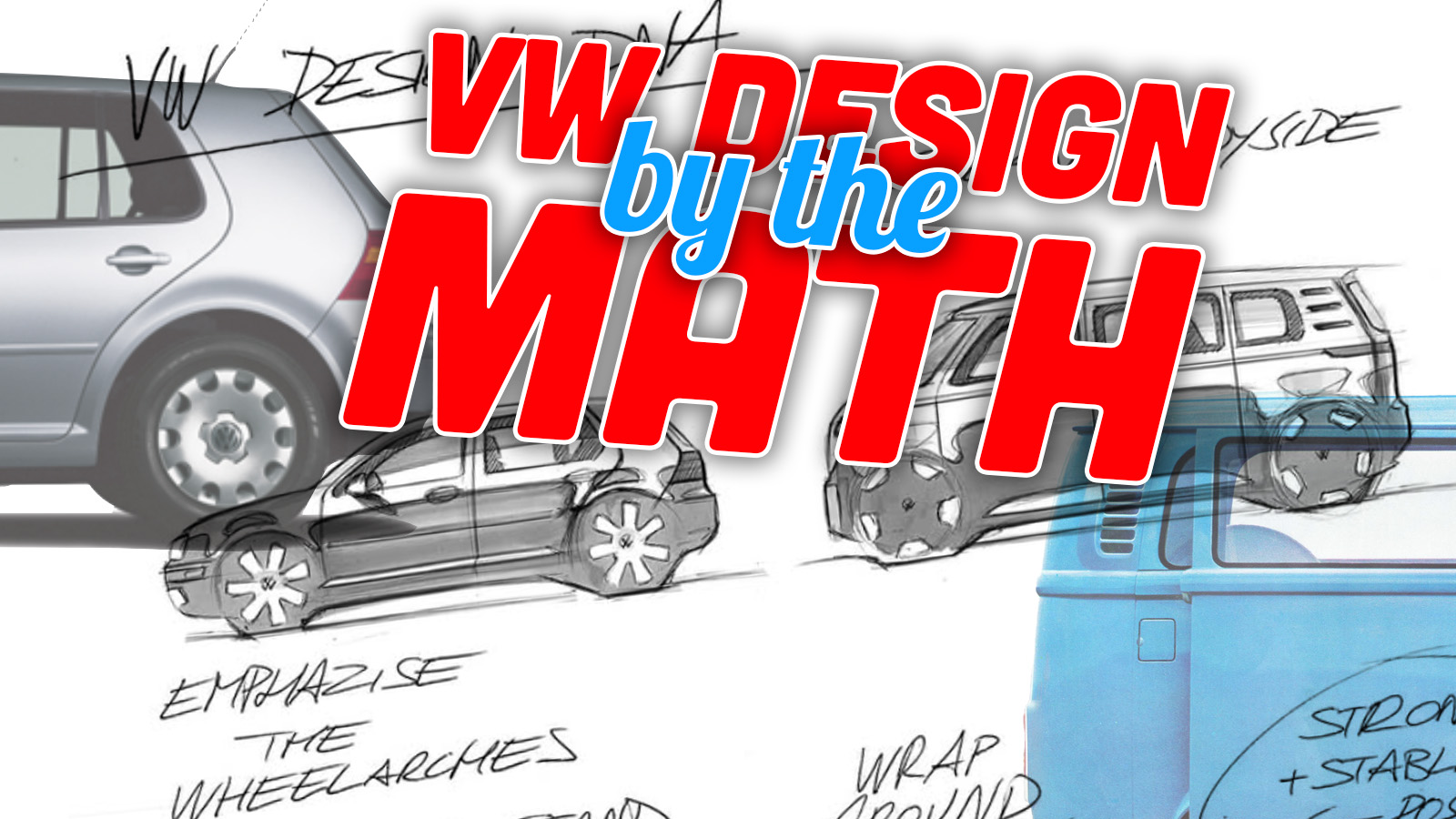







You could put Range Rover badges on that ID.Cross concept and nobody would question it.
I loved how the C-Post design exactly matched the cutout for the hatch on Golfs through so many generations. Both were a sporty design and that they matched was so incredibly genius. And aesthetically pleasing.
The italdesign first gen golf and scirocco, those are the cleanest, best looking Volkswagens to my eye, why not start there for their language? And just make a (new) new beetle that is as simple in its own way as the Slate pickup, there will be a waiting list. With ROUND HEADLIGHTS, please. Good god almighty why won’t they do it? Two friendly round headlights would have at least doubled the sales of the ID.Buzz.
Where are the headlights
compared to the BMW i-thing, it’s an underwear model
It looks like a sketch of generic crossover, but with BIG wheels. The only “undeniably Volkswagen” thing about it is the emblems.
The C-pillar treatment is a complete mess compared to the nearly perfect Golf. Hiding the top half in the piano black plastic with (backlit?) fake vents and then completely forgetting the assignment and breaking the line with the taillights. I don’t think it is a bad looking concept and if priced right could be a huge hit because of the current market but the brand DNA is BS.
The gen 4 Golf C-pillar and panel cuts is a masterpiece. Funny how Mindt emphasizes a strong C-pillar as an important part of the design langauge, then immediately undermines it with a hidden Ford Explorer-type C-pillar on the C-cross concept.
What is a flying roof?
I was about to ask the same thing! Wtf is that.
I think they mean the effect of blacking out all of the pillars so the roof feels like its own shape, which I’ve seen as a “floating roof”… but they want to jazz it up a bit more so “float” becomes “fly”?
Volkswagen doesn’t really have a design language, and putting some crap C-pillar vent doesn’t make it so. Cars with a design language are imediately recognized as part of a manufacturer’s distinct “family” Thinknl Kia, Hyundai, Mazda, Porsche, Cadillac, etc.
Yeah, I’ve felt like Volkswagens design language has been in transition for like the past 15 years. Once the left the Mk 4 era behind, the Mk 5 Golf had a clear design language. And then everything kinda fizzled out. The Mk 6 looked fine, but as far as a corporate identity, it was lacking. I think the Mk 7 was an improvement, and owned one myself, but again, pretty weak design language when you looked at the other models offered. And then everything went to complete shit. The Buzz is nice, but it’s largely carried by it’s historical elements, and a lot of the “new” elements are kinda meh. The other ID cars are boring as hell.
GG VW,
Generic
Giant Wheels
I’ve resigned myself to ‘old man yelling at cloud’ status because I find these, as well as pretty much any ‘modern’ design, ugly.
BMW used to be designed like an expensive Saville Row suit. Now they’re a track suit, possibly with Juicy on the butt. VW was like a jacket from JC Penney – not top quality but pretty damned good enough for most people. Now? I don’t know, I ran out of comparison stuff.
Everyone tries to be Ian Kettle when they design a small Crossover, and yet they all fall short of the XC40
I’m not a farmer but I sure can smell BS. This looks like generic stylized crossover with giant rims that it won’t really look like when launched. Look at the Bishops option to make the Macan look like a Beetle, now THAT’s how to do VW styling. This…this is not that.
I remember looking at VW Golfs and noticing they had really amazing C-pillars.
…so why does this SUV have a stupid diagonal line on it?
Maybe they could have fit in the reference if the wheels and cladding didn’t cut off most of the shape. Smaller wheels would also allow them to give it less of an SUV-nose, if civilian casualties through cosplay of obesity weren’t a desirable feature.
Would give you more range on an electric, too.
Shakes fist at clouds and repeats: THIS IS NOT DESIGN, IT’S STYLING.
no snark, are you an engineer?
Industrial designer, but no longer directly working in that field. No engineering, other than what I had to learn about manufacturing processes and materials, as well as how make an engineer feel superior when you are talking to them.
The problem with referencing another car in a design is that it assumes the audience is familiar with that car. I’ve seen fewer than half a dozen ID Buzzes since it went on sale; they’re definitely not the thing VW is known for anymore
It’s basically a confusing in-joke.
I defy anyone to look at a sketch of the ID.Cross’ side profile and recognize it as a VW right off the bat. There are few brands this design couldn’t be.
And stop drawing these cars with giant rims, dude. Did Xzibit take a pass at this, or what?!
I tried, and I think the only thing stopping me from assigning it other brands was that other brands had more recognizable shapes in them…
I looked up “2025 Mitsubishi” reaching for a crossover brand I’m apathetic towards, and the side profiles were mostly distinguished by the giant blocky light-thing they have.
Chevy Blazer EV has some side vent line-thing toward the front…I remembered the MOST universal electric crossover! The fake Honda Blazer.
The 2025 Honda Prologue has way more in common with that Mk4 Golf than the concept.
So he designed a Land Rover Evoque with inflated tires. But the process was interesting, thanks for breaking it down so neatly.
Tires only inflate if there’s room for air in them.
On that note, I used to work with tires, so maybe these designers could either finally get actual “airless tires” or give the poor folks some sidewall to work with. This is bordering an attack on the working class.
I was going to say this too haha
I do think it’s pretty neat that the concept sketches were shared. Considering the slathering of generic crossover design elements that everyone and their mother has, it’s pretty inoffensive looking: not ugly but extremely bland especially considering the sea of greyscale I already know it’s gonna be in.
With that being said, it’s pretty practically sized and I think it could sell as long as it’s not saddled with an obnoxious price tag or “oops all haptic feedback”, but we’ll see if VW actually learned their lesson.
He’s probably pissed that the need to fit people inside the car prevented the whole thing from just being a giant set of wheels
entire sketchbook devoted to people commuting in that thing Axel drives in Twisted Metal
here’s your extra credit +1 since I can only give you 1 to speak of
IMHO if you want to see what future car designs will look like go back to the medium of the day for when the designers were young adults and into vehicles. They get inspired design the future versions they fell for and then the bean counting starts and they allow some of that to shine through. These VWs look like vehicles from comic books in the 70s. IMHO I bet AI could design a similar car based on date of designer and vehicle regulations.
It would look better with a real body-matched rear pillar. It’s becoming a feature of the 2020s, those fake-slatted window appliques present on things like the C5 X and Ford Explorer EV. I’m not sure the point as it ruins visibility through the window, doesn’t convincingly hide any pillars, and will look dated the moment everyone decides that isn’t what the future looks like anymore. Can they bring back actual louvers instead?
The S-curve C pillar is fine – but “Emphasize the wheel arches” and filling them with oversized, complex wheel/tire combos is the WRONG move for VW.
And the “Floating roof” is superfluous fluff which is not specific to, nor does it differentiate, VW. And the fake roof vents are cute but completely unnecessary.
Let Audi get the wheel arches, big wheels, etc – VW DNA is simplicity, functionality and economy.
Their designer needs to lean into that.